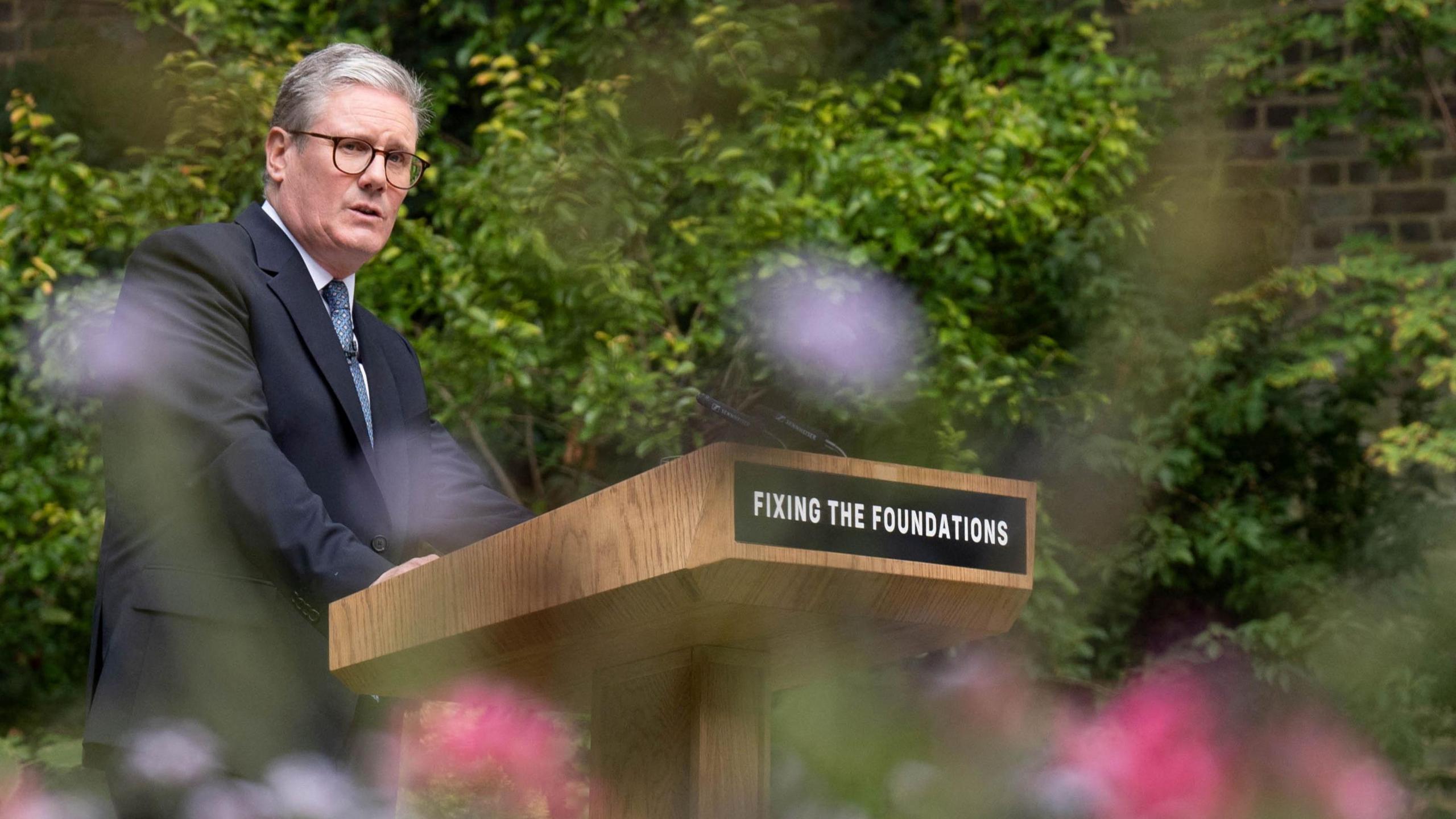Five key points from Starmer's speech

- Published
On Tuesday morning, Sir Keir Starmer delivered a speech in the Downing Street garden on the state of the nation and what his government plans to do.
Here are the key points:
A painful Budget
On a sunny day, the prime minister offered a gloomy assessment of the public finances, warning things would "get worse before they get better".
He said the autumn Budget - where the government sets out its tax and spend plans - would be "painful" and that he would be making "big asks" of the country.
The public, he said, should be prepared to "accept short-term pain for long-term good".
He did not detail what measures would be in the Budget but repeated his election promise that national insurance, VAT and income tax would not go up.
Last month, Chancellor Rachel Reeves said she thought she would have to increase taxes in the Budget and did not rule out increasing inheritance tax, capital gains tax, or reforming tax relief on pensions.
You can find more information about what taxes Labour might rise here.
Winter fuel payments
In a bid to save money, the government has already announced that it will withdraw winter fuel payments from 10 million pensioners in England and Wales.
This winter, pensioners not receiving pension credit or other means-tested benefits will stop getting the payments, worth between £100-300.
Age UK have called the plan "reckless" saying it would "spell disaster" for pensioners on low and modest income - and, privately, some Labour MPs are also unhappy about it.
Addressing the decision in his speech, Sir Keir said he "didn't want to means-test the winter fuel payment but it was a choice we had to take".
Blaming the Conservatives
Sir Keir argued he was having to make these choices because of the state the Conservatives had left the country in.
He accused his predecessors of "recklessness" and said that after winning the general election in July, his government had "discovered a £22bn black hole in the public finances".
He also said the Tory government had avoided difficult problems and "failed to be honest" offering instead "the snake oil of populism".
In response Conservative leader - and former prime minister - Rishi Sunak said Sir Keir's speech was "the clearest indication of what Labour has been planning to do all along - raise your taxes".
Conservative MP Robert Jenrick, who is a candidate in the race to replace Mr Sunak as party leader, accused Sir Keir of "shamelessly attempting to rewrite history" and laying "the groundwork for huge tax rises".
The BBC's chief political correspondent Henry Zeffman explains here why Sir Keir's attacks on the Tories will not stop any time soon.
Rioters 'knew system was broken'
Sir Keir claimed the Conservatives had damaged not just the economy but society as well.
In his former life as a top lawyer, the PM was the chief prosecutor for England and Wales in 2011, during the last major outbreak of riots and civil unrest.
Looking back at that time, he said: "I didn't doubt the courts could do what they needed to do.
"This time – to be honest with you - I genuinely didn’t know.
"Every day – literally every day - we had to check the precise number of prison places we had and where those places were to make sure we could arrest, charge and prosecute people quickly."
He said rioters knew "the system was broken" and believed they could commit acts of violence because they wouldn't be arrested or prosecuted.
"They saw the cracks in our society after 14 years of failure - and they exploited it."
The prime minister added that the riots "didn't just betray the sickness, they also revealed the cure" and praised those who cleaned up the streets after the riots.
Cronyism allegations
Sir Keir is facing accusations from the Conservatives that he is handing important taxpayer-funded jobs to Labour supporters and donors - the kind of "cronyism" Labour used to accuse them of practising.
Asked about this by journalists after his speech, he said: "I'm not really going to take lectures on this from the people who dragged our country so far down in the last few years."
He said he wanted to work "at speed", adding: "I'm enormously aware of how big a task this is and how we have to move at pace, and that's why we're getting the best people into the best jobs."
He insisted that didn't mean "process doesn't matter" and that he was absolutely determined to restore honesty and integrity to government.
Over the past few weeks, the Tories have criticised Labour for appointing a donor to a Treasury role and giving another donor, Lord Alli, a temporary pass to No 10.
Sir Keir defended this, telling journalists: "He was doing some transition work with us, he had a pass for a short-term time to do that work, and the work finished, and he hasn't got a pass. That's the state of affairs."